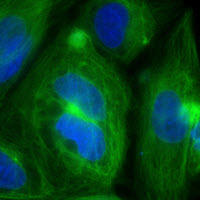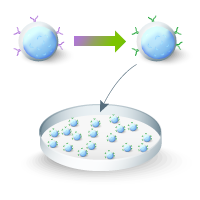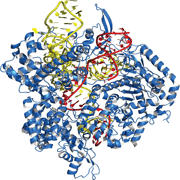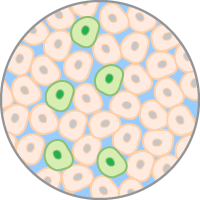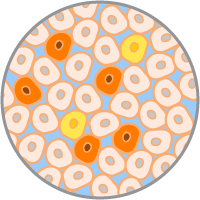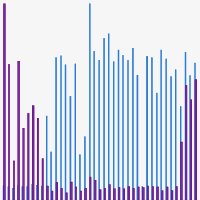Guide-it Long ssDNA Production System v2
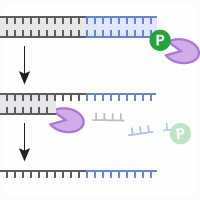
The Guide-it Long ssDNA Production System v2 enables on-demand production of long single-stranded DNA (ssDNA) up to 5,000 nt in length for use as a repair template in knockin experiments involving CRISPR/Cas9 technology or other genome editing tools. This kit provides a simple and fast method for converting a dsDNA PCR product of any sequence into ssDNA via selective digestion of either the sense or the antisense strand. Each kit allows for preparation of 50 ssDNA templates.
The Guide-it Long ssDNA Production System v2 enables on-demand production of long single-stranded DNA (ssDNA) up to 5,000 nt in length for use as a repair template in knockin experiments involving CRISPR/Cas9 technology or other genome editing tools. This kit provides a simple and fast method for converting a dsDNA PCR product of any sequence into ssDNA via selective digestion of either the sense or the antisense strand. Each kit allows for the preparation of 50 ssDNA templates.
Although ssDNA templates have been shown to provide several important advantages over dsDNA templates for precise genome editing applications utilizing homology directed repair (HDR) (Roth et al., 2018), the use of long ssDNA has been limited due to the difficulty and cost of producing it. The Guide-it Long ssDNA Production System v2 is designed to make the benefits of ssDNA templates accessible to all researchers by providing an efficient, economical method for obtaining ssDNA on demand.
Benefits of using ssDNA as a template over dsDNA:
- Significantly reduced random and off-target integration, resulting in improved gene editing efficiency and lower likelihood of experimental artefacts
- Minimal cytotoxicity, enabling recovery of larger populations of edited cells
- Negligible transgene expression from nonintegrated templates, allowing for easier identification of correctly edited clones
Overview
- On-demand production of ssDNA donor templates ranging from 500–5,000 nt for gene knockin applications
- Simple and fast protocol takes only a few hours to complete
- Dramatically reduced off-target integration as compared to dsDNA templates
- Minimal cytotoxicity, resulting in greater viability of edited cell populations
More Information
The Guide-it Long ssDNA Production System v2 includes refinements that enable more efficient processing of challenging templates, provide higher ssDNA yields, and allow for a simpler protocol as compared to our first-generation ssDNA kits (Cat. # 632644, 632645).*

Improved generation of ssDNA with the Guide-it Long ssDNA Production System v2. Gel image showing the dsDNA starting material (Lane 1) and sense (SS) or antisense (AS) ssDNA products for several HDR templates generated using the original (v1) or updated (v2) versions of the Guide-it Long ssDNA Production System (Lane 2 and Lane 3, respectively). dsDNA templates included in this analysis had been identified as challenging substrates for ssDNA generation using the v1 Guide-it kit. The dsDNA and ssDNA were analyzed via agarose gel electrophoresis using ethidium bromide as a staining agent. ssDNA products run at a smaller molecular weight than corresponding dsDNA substrates. In all cases, the Guide-it Long ssDNA Production System v2 generated a cleaner band of ssDNA than the previous version of the kit, suggesting more complete and uniform digestion.
*Please note that with the launch of the Guide-it Long ssDNA Production System v2, the original Guide-it ssDNA kits (Cat. # 632644, 632645) have been discontinued.
Additional product information
Please see the product's Certificate of Analysis for information about storage conditions, product components, and technical specifications. Please see the Kit Components List to determine kit components. Certificates of Analysis and Kit Components Lists are located under the Documents tab.
Choose an HDR template format
Watch a webinar on how to choose the right HDR template for knockin experiments.
Homology-directed repair FAQs
Maximize your likelihood for success by reading these FAQs compiled by our R&D team.
Gene editing of T cells and HSCs
Follow these protocols developed by our R&D team for easy CRISPR/Cas-based gene editing of immune cells.
Site-specific gene knockins using long ssDNA
Gene knockins with long ssDNA sequences produced using Guide-it Long ssDNA Production System v2.
CRISPR/Cas9-mediated knockins in iPS cells
Data demonstrating efficient genome editing of iPS cells using HDR templates generated with the Guide-it Long ssDNA Production System.
CRISPR takes a giant step towards the clinic
Learn about the development of a powerful new method for reprogramming T cells.
Mouse CRISPR knockin protocol
Access a customer-developed protocol for precise genome editing in mouse embryos.
Electroporation-grade Cas9 for editing in diverse cell types
Our Cas9 performs highly efficient gene editing, including in iPS and hematopoietic stem cells.
Screening for effective guide RNAs
Before delivering sgRNA to your cells, use a novel in vitro assay to get accurate predictions of sgRNA cleavage efficiency.
Tag an endogenous gene with AcGFP1 in iPS cells
Workflow for tagging endogenous genes to generate reporter lines.
Tag an endogenous gene with a myc tag in iPS cells
Workflow for tagging endogenous genes with an epitope tag.
Efficient SNP engineering
Learn about a simple assay for sensitive detection of single-nucleotide substitutions in bulk-edited or clonal cell populations.
Takara Bio USA, Inc.
United States/Canada: +1.800.662.2566 • Asia Pacific: +1.650.919.7300 • Europe: +33.(0)1.3904.6880 • Japan: +81.(0)77.565.6999
FOR RESEARCH USE ONLY. NOT FOR USE IN DIAGNOSTIC PROCEDURES. © 2025 Takara Bio Inc. All Rights Reserved. All trademarks are the property of Takara Bio Inc. or its affiliate(s) in the U.S. and/or other countries or their respective owners. Certain trademarks may not be registered in all jurisdictions. Additional product, intellectual property, and restricted use information is available at takarabio.com.



